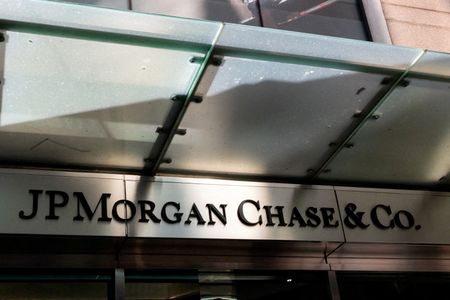By Niket Nishant and Nupur Anand
(Reuters) -JPMorgan Chase beat expectations for third-quarter profit on Friday as rising borrowing costs and its acquisition of failed First Republic Bank drove income from interest payments to a record high.
JPMorgan took on billions of dollars in consumer loans after it rescued First Republic in May, bolstering its net interest income (NII), or the difference between what a bank earns on loans and pays out on deposits.
While U.S. consumers remain healthy, CEO Jamie Dimon warned geopolitical tensions including the war in Ukraine and conflict in Israel could keep inflation at elevated levels.
“This may be the most dangerous time the world has seen in decades,” said Dimon, who leads the biggest U.S. lender.
NII rose 30% to $22.9 billion, the bank said. Excluding the impact of First Republic, it still rose 21%. JPMorgan also raised its NII forecast for this year to $89 billion, boosting it $2 billion from an earlier estimate.
Shares rose more than 3%.
Chief Financial Officer Jeremy Barnum cautioned that the current NII levels were not sustainable and could moderate to around $80 billion.
The Federal Reserve has held interest rates steady, but has indicated it could keep borrowing costs higher for a prolonged period.
The results “look really good and it just shows what a great operator they are,” said Eric Kuby, chief investment officer at North Star Investment Management in Chicago, who owns JPMorgan shares. “This just showed what a really well run bank can do in a tough environment,” Kuby said.
The bank released $113 million in net reserves in the third quarter on back of an improved economic outlook. Modest growth over the next few quarters has replaced the recessionary outlook forecasted earlier, Barnum said.
INVESTMENT BANKING LULL
While the market for mergers and acquisitions (M&A) and initial public offerings (IPOs) is showing signs of a recovery, lingering economic uncertainty continues to be a drag on dealmaking activity.
September saw stock market debuts of several high-profile companies, including SoftBank Group’s chip designer Arm Holdings and grocery delivery app Instacart. JPMorgan was an underwriter for both of those listings.
But these newly listed companies have given back most of their gains after their first-day pop, crushing hopes of a meaningful recovery in the IPO market.
Investment banking revenue at JPMorgan fell 6% to $1.6 billion. The outlook for investment banking is slightly more optimistic than last quarter, Barnum said, despite hurdles in mergers and acquisitions.
JPMorgan has so far managed to avoid mass layoffs in contrast with some of its Wall Street rivals that have laid off thousands of employees. The bank’s workforce grew almost 3%, or 8,603 employees, to 308,669 at the end of the third quarter as it added First Republic employees.
But the company could adjust its headcount depending on the investment banking environment, Barnum said.
The bank has reorganized the leadership in its investment bank, promoting a new head in North America to succeed Fernando Rivas, who plans to retire, Reuters reported last month.
The bank’s consumer business remains a key area of growth, with more demand for car lending and credit cards, but that could slow down, Barnum said.
The bank also booked nearly $700 million in legal expenses. Last month, JPMorgan agreed to pay $75 million to settle claims by the U.S. Virgin Islands that it aided in the disgraced financier Jeffrey Epstein’s sex trafficking.
As part of another settlement in June, it had also agreed to pay about $290 million to settle a class action lawsuit by Epstein’s victims. JPMorgan did not admit wrongdoing in either case. The settlements largely resolved a scandal that has weighed on JPMorgan all year.
The lender’s profit rose 35% to $13.15 billion, or $4.33 per share, for the three months ended Sept. 30.
Excluding one-time costs, the bank reported a profit of $4.50 per share, above analysts’ average estimate of $3.96 per share, according to LSEG IBES data.
JPMorgan also set aside $1.4 billion for potential losses on souring loans.
“The first half of this year has seen JPMorgan set itself apart from the rest of the U.S. banking sector,” said Michael Hewson, chief market Analyst at CMC Markets UK.
Rivals Citigroup and Wells Fargo also reported third-quarter profit above expectations.
BASEL III ENDGAME
Executives reiterated their strong opposition to draft rules that would raise capital requirements for large lenders.
JPMorgan may need to exit certain businesses if the proposals are implemented because it could be forced to set aside 25% more capital, or $50 billion, Barnum said.
Dimon has previously blasted stricter capital rules proposed by U.S. regulators. The draft regulations could prompt lenders to pull back and stymie economic growth, he told investors last month.
The moves to require banks to set aside more capital were “hugely disappointing,” he said.
(Reporting by Niket Nishant in Bengaluru and Nupur Anand in New York, additional reporting by Lewis Krauskopf, editing by Lananh Nguyen, Anil D’Silva and Nick Zieminski)

